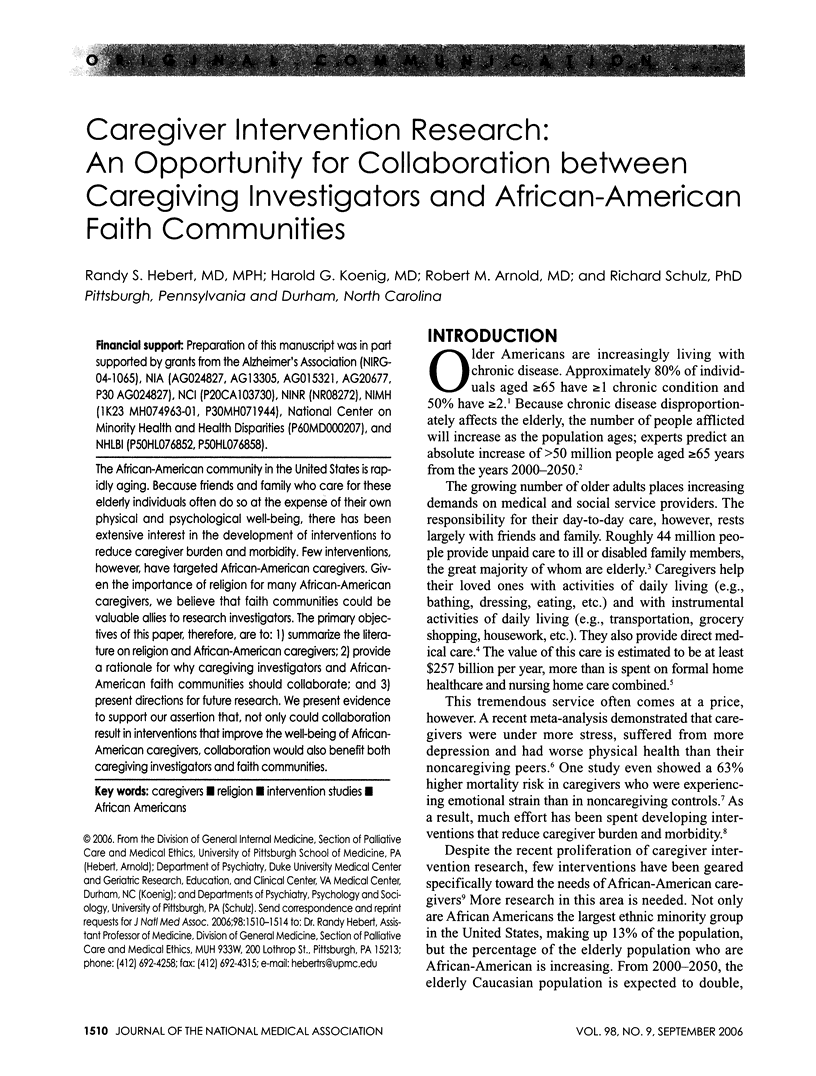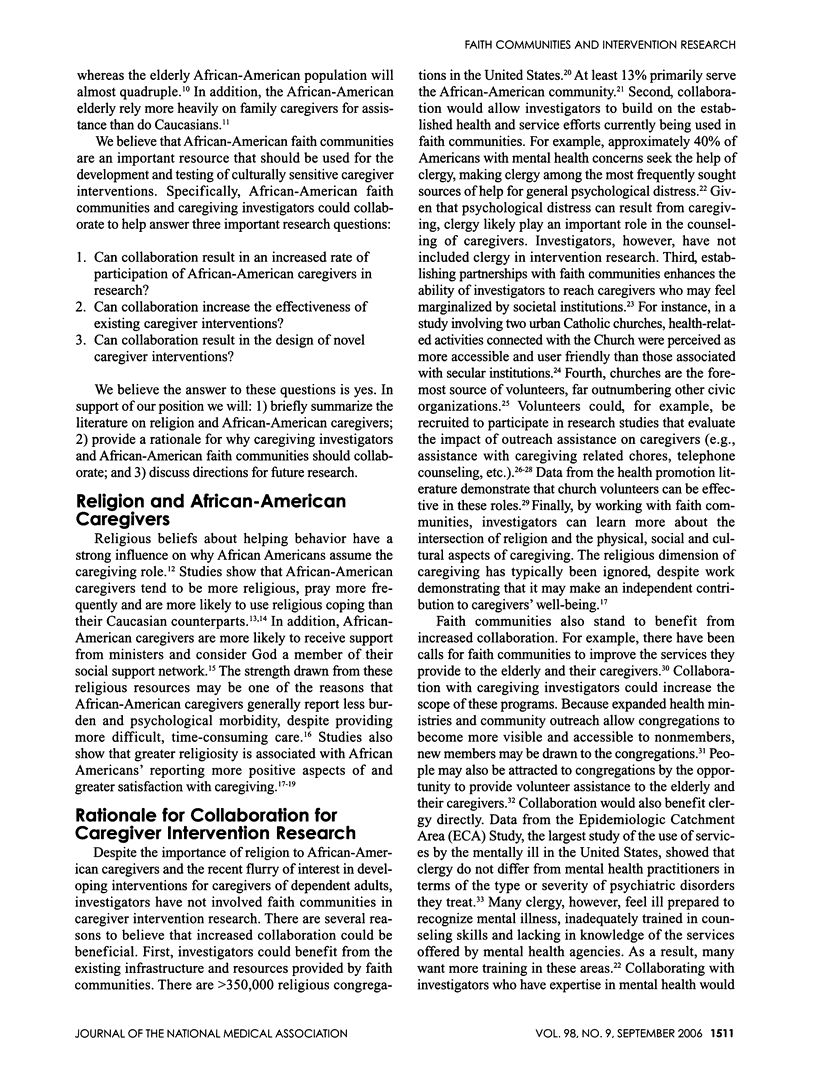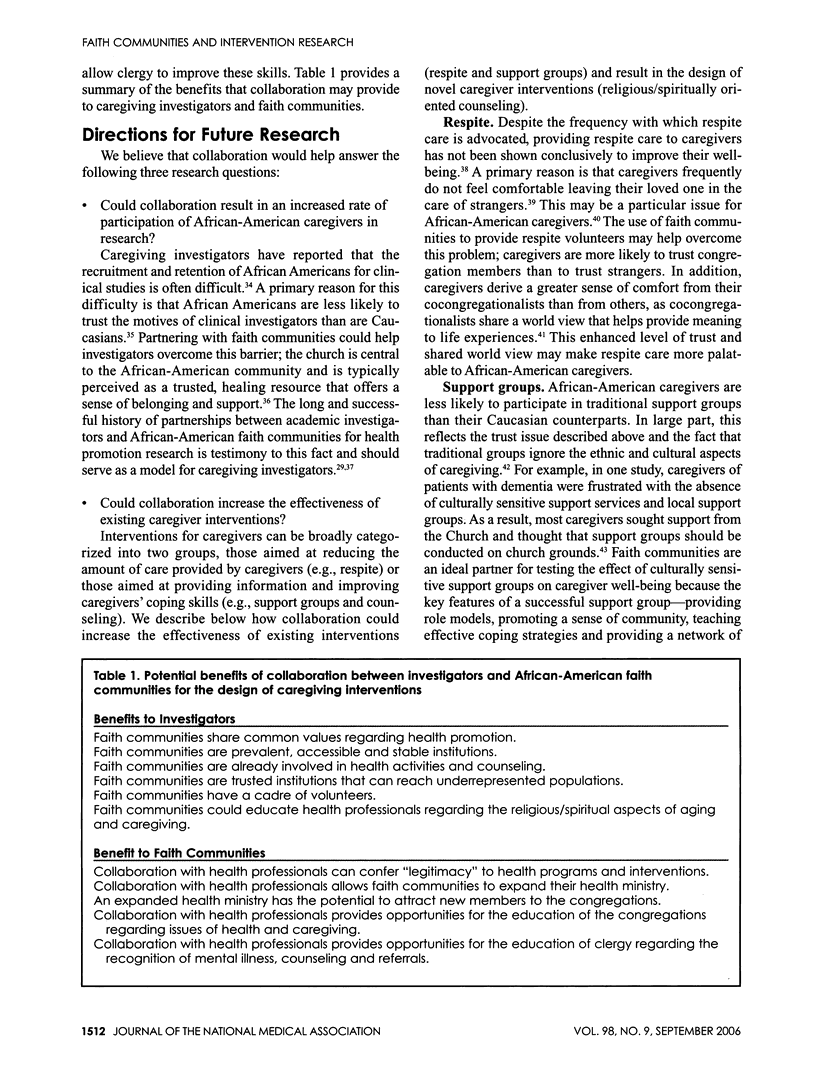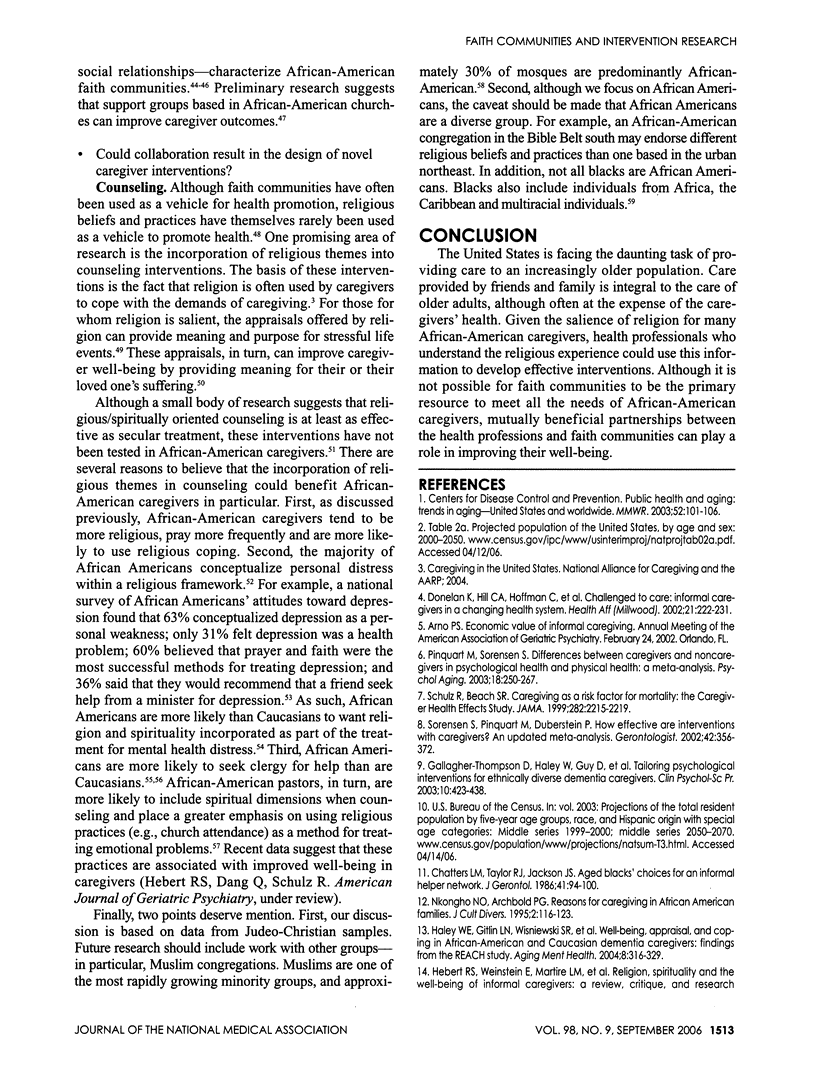Abstract
The African-American community in the United States is rapidly aging. Because friends and family who care for these elderly individuals often do so at the expense of their own physical and psychological well-being, there has been extensive interest in the development of interventions to reduce caregiver burden and morbidity. Few interventions, however, have targeted African-American caregivers. Given the importance of religion for many African-American caregivers, we believe that faith communities could be valuable allies to research investigators. The primary objectives of this paper, therefore, are to: 1) summarize the literature on religion and African-American caregivers; 2) provide a rationale for why caregiving investigators and African-American faith communities should collaborate; and 3) present directions for future research. We present evidence to support our assertion that, not only could collaboration result in interventions that improve the well-being of African-American caregivers, collaboration would also benefit both caregiving investigators and faith communities.
Full text
PDF




Selected References
These references are in PubMed. This may not be the complete list of references from this article.
- Brunner S. L. Collaborative efforts support poor elderly. A nursing center teams up with area churches to care for the elderly in their homes. Health Prog. 1994 Sep;75(7):46–48. [PubMed] [Google Scholar]
- Centers for Disease Control and Prevention (CDC) Trends in aging--United States and worldwide. MMWR Morb Mortal Wkly Rep. 2003 Feb 14;52(6):101-4, 106. [PubMed] [Google Scholar]
- Chadiha Letha A., Morrow-Howell Nancy, Proctor Enola K., Picot Sandra J. Fulton, Gillespie Danette C., Pandey Pramod, Dey Alicia. Involving rural, older African Americans and their female informal caregivers in research. J Aging Health. 2004 Nov;16(5 Suppl):18S–38S. doi: 10.1177/0898264304268147. [DOI] [PubMed] [Google Scholar]
- Chase-Ziolek M., Gruca J. Clients' perceptions of distinctive aspects in nursing care received within a congregational setting. J Community Health Nurs. 2000 Fall;17(3):171–183. doi: 10.1207/S15327655JCHN1703_05. [DOI] [PubMed] [Google Scholar]
- Chatters L. M., Levin J. S., Ellison C. G. Public health and health education in faith communities. Health Educ Behav. 1998 Dec;25(6):689–699. doi: 10.1177/109019819802500602. [DOI] [PubMed] [Google Scholar]
- Chatters L. M., Taylor R. J., Jackson J. S. Aged blacks' choices for an informal helper network. J Gerontol. 1986 Jan;41(1):94–100. doi: 10.1093/geronj/41.1.94. [DOI] [PubMed] [Google Scholar]
- Cooper-Patrick L., Powe N. R., Jenckes M. W., Gonzales J. J., Levine D. M., Ford D. E. Identification of patient attitudes and preferences regarding treatment of depression. J Gen Intern Med. 1997 Jul;12(7):431–438. doi: 10.1046/j.1525-1497.1997.00075.x. [DOI] [PMC free article] [PubMed] [Google Scholar]
- Corbie-Smith Giselle, Thomas Stephen B., St George Diane Marie M. Distrust, race, and research. Arch Intern Med. 2002 Nov 25;162(21):2458–2463. doi: 10.1001/archinte.162.21.2458. [DOI] [PubMed] [Google Scholar]
- Dilworth-Anderson Peggye, Williams Ishan Canty, Gibson Brent E. Issues of race, ethnicity, and culture in caregiving research: a 20-year review (1980-2000). Gerontologist. 2002 Apr;42(2):237–272. doi: 10.1093/geront/42.2.237. [DOI] [PubMed] [Google Scholar]
- Donelan Karen, Hill Craig A., Hoffman Catherine, Scoles Kimberly, Feldman Penny Hollander, Levine Carol, Gould David. Challenged to care: informal caregivers in a changing health system. Health Aff (Millwood) 2002 Jul-Aug;21(4):222–231. doi: 10.1377/hlthaff.21.4.222. [DOI] [PubMed] [Google Scholar]
- Fahey C. J. A new role for the Church. Dioceses should do more in providing care for dependent and dying persons. Health Prog. 1998 Sep-Oct;79(5):34-7, 51. [PubMed] [Google Scholar]
- Filinson R. A model for church-based services for frail elderly persons and their families. Gerontologist. 1988 Aug;28(4):483–486. doi: 10.1093/geront/28.4.483. [DOI] [PubMed] [Google Scholar]
- Gallo J. J., Marino S., Ford D., Anthony J. C. Filters on the pathway to mental health care, II. Sociodemographic factors. Psychol Med. 1995 Nov;25(6):1149–1160. doi: 10.1017/s0033291700033122. [DOI] [PubMed] [Google Scholar]
- Haley W. E., Gitlin L. N., Wisniewski S. R., Mahoney D. Feeney, Coon D. W., Winter L., Corcoran M., Schinfeld S., Ory M. Well-being, appraisal, and coping in African-American and Caucasian dementia caregivers: findings from the REACH study. Aging Ment Health. 2004 Jul;8(4):316–329. doi: 10.1080/13607860410001728998. [DOI] [PubMed] [Google Scholar]
- Harding R., Higginson I. Working with ambivalence: informal caregivers of patients at the end of life. Support Care Cancer. 2001 Nov;9(8):642–645. doi: 10.1007/s005200100286. [DOI] [PubMed] [Google Scholar]
- Jackson R. S., Reddick B. The African American church and university partnerships: establishing lasting collaborations. Health Educ Behav. 1999 Oct;26(5):663–674. doi: 10.1177/109019819902600507. [DOI] [PubMed] [Google Scholar]
- Kerner J. F., Dusenbury L., Mandelblatt J. S. Poverty and cultural diversity: challenges for health promotion among the medically underserved. Annu Rev Public Health. 1993;14:355–377. doi: 10.1146/annurev.pu.14.050193.002035. [DOI] [PubMed] [Google Scholar]
- Kosloski Karl, Schaefer Jay P., Allwardt Debra, Montgomery Rhonda J. V., Karner Tracy X. The role of cultural factors on clients' attitudes toward caregiving, perceptions of service delivery, and service utilization. Home Health Care Serv Q. 2002;21(3-4):65–88. doi: 10.1300/J027v21n03_04. [DOI] [PubMed] [Google Scholar]
- Lampley-Dallas V. T., Mold J. W., Flori D. E. Perceived needs of African-American caregivers of elders with dementia. J Natl Med Assoc. 2001 Feb;93(2):47–57. [PMC free article] [PubMed] [Google Scholar]
- Larson D. B., Hohmann A. A., Kessler L. G., Meador K. G., Boyd J. H., McSherry E. The couch and the cloth: the need for linkage. Hosp Community Psychiatry. 1988 Oct;39(10):1064–1069. doi: 10.1176/ps.39.10.1064. [DOI] [PubMed] [Google Scholar]
- Lee H., Cameron M. Respite care for people with dementia and their carers. Cochrane Database Syst Rev. 2004;(2):CD004396–CD004396. doi: 10.1002/14651858.CD004396.pub2. [DOI] [PubMed] [Google Scholar]
- McRae M. B., Carey P. M., Anderson-Scott R. Black churches as therapeutic systems: a group process perspective. Health Educ Behav. 1998 Dec;25(6):778–789. doi: 10.1177/109019819802500607. [DOI] [PubMed] [Google Scholar]
- Miltiades Helen B., Pruchno Rachel. The effect of religious coping on caregiving appraisals of mothers of adults with developmental disabilities. Gerontologist. 2002 Feb;42(1):82–91. doi: 10.1093/geront/42.1.82. [DOI] [PubMed] [Google Scholar]
- Neighbors H. W., Musick M. A., Williams D. R. The African American minister as a source of help for serious personal crises: bridge or barrier to mental health care? Health Educ Behav. 1998 Dec;25(6):759–777. doi: 10.1177/109019819802500606. [DOI] [PubMed] [Google Scholar]
- Nkongho N. O., Archbold P. G. Reasons for caregiving in African American families. J Cult Divers. 1995 Fall;2(4):116–123. [PubMed] [Google Scholar]
- Pickett-Schenk Susan A. Church-based support groups for African American families coping with mental illness: outreach and outcomes. Psychiatr Rehabil J. 2002 Fall;26(2):173–180. doi: 10.2975/26.2002.173.180. [DOI] [PubMed] [Google Scholar]
- Picot S. J., Debanne S. M., Namazi K. H., Wykle M. L. Religiosity and perceived rewards of black and white caregivers. Gerontologist. 1997 Feb;37(1):89–101. doi: 10.1093/geront/37.1.89. [DOI] [PubMed] [Google Scholar]
- Pierce L. L. Caring and expressions of spirituality by urban caregivers of people with stroke in African American families. Qual Health Res. 2001 May;11(3):339–352. doi: 10.1177/104973230101100305. [DOI] [PubMed] [Google Scholar]
- Pinquart Martin, Sörensen Silvia. Differences between caregivers and noncaregivers in psychological health and physical health: a meta-analysis. Psychol Aging. 2003 Jun;18(2):250–267. doi: 10.1037/0882-7974.18.2.250. [DOI] [PubMed] [Google Scholar]
- Roff Lucinda Lee, Burgio Louis D., Gitlin Laura, Nichols Linda, Chaplin William, Hardin J. Michael. Positive aspects of Alzheimer's caregiving: the role of race. J Gerontol B Psychol Sci Soc Sci. 2004 Jul;59(4):P185–P190. doi: 10.1093/geronb/59.4.p185. [DOI] [PubMed] [Google Scholar]
- Schulz R., Beach S. R. Caregiving as a risk factor for mortality: the Caregiver Health Effects Study. JAMA. 1999 Dec 15;282(23):2215–2219. doi: 10.1001/jama.282.23.2215. [DOI] [PubMed] [Google Scholar]
- Sussman L. K., Robins L. N., Earls F. Treatment-seeking for depression by black and white Americans. Soc Sci Med. 1987;24(3):187–196. doi: 10.1016/0277-9536(87)90046-3. [DOI] [PubMed] [Google Scholar]
- Sörensen Silvia, Pinquart Martin, Duberstein Paul. How effective are interventions with caregivers? An updated meta-analysis. Gerontologist. 2002 Jun;42(3):356–372. doi: 10.1093/geront/42.3.356. [DOI] [PubMed] [Google Scholar]
- Weaver A. J. Has there been a failure to prepare and support parish-based clergy in their role as frontline community mental health workers: a review. J Pastoral Care. 1995 Summer;49(2):129–147. doi: 10.1177/002234099504900203. [DOI] [PubMed] [Google Scholar]
- Wexberg R. Bridging the gaps in geriatric care. Volunteers help meet the elderly's nonmedical needs. Health Prog. 1996 Nov-Dec;77(6):38–41. [PubMed] [Google Scholar]
- Williams D. R., Jackson J. S. Race/ethnicity and the 2000 census: recommendations for African American and other black populations in the United States. Am J Public Health. 2000 Nov;90(11):1728–1730. doi: 10.2105/ajph.90.11.1728. [DOI] [PMC free article] [PubMed] [Google Scholar]
- Young John L., Griffith Ezra E. H., Williams David R. The integral role of pastoral counseling by African-American clergy in community mental health. Psychiatr Serv. 2003 May;54(5):688–692. doi: 10.1176/appi.ps.54.5.688. [DOI] [PubMed] [Google Scholar]


